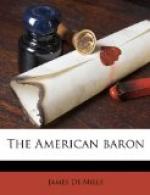“Here we separated. I left England, and have never been there since.”
Dacres stopped, and sat silent for a long time.
“Could she have been mad?” asked Hawbury.
“I used to think so, but I believe not. She showed too much sense in every thing relating to herself. She sold pictures and timber, and kept every penny. She was acute enough in grasping all she could. During our last interviews while making these arrangements she was perfectly cool and lady-like.
“Have you ever heard about her since?”
“Never.”
“Is she alive yet?”
“That’s the bother.”
“What! don’t you know?”
“No.”
“Haven’t you ever tried to find out?”
“Yes. Two years ago I went and had inquiries made at Exeter. Nothing could be found out. She and her father had left the place immediately after my departure, and nothing was known about them.”
“I wonder that you didn’t go yourself?”
“What for? I didn’t care about seeing her or finding her.”
“Do you think she’s alive yet?”
“I’m afraid she is. You see she always had excellent health, and there’s no reason why she should not live to be an octogenarian.”
“Yet she may be dead.”
“May be! And what sort of comfort is that to me in my present position, I should like to know? May be? Is that a sufficient foundation for me to build on? No. In a moment of thoughtlessness I have allowed myself to forget the horrible position in which I am. But now I recall it. I’ll crush down my feelings, and be a man again. I’ll see the child-angel once more; once more feast my soul over her sweet and exquisite loveliness; once more get a glance from her tender, innocent, and guileless eyes, and then away to South America.”
“You said your wife took another name.”
“Yes.”
“What was it? Do you know it?”
“Oh yes; it was Willoughby”
“Willoughby!” cried Hawbury, with a start; “why, that’s the name of my Ethel’s friend, at Montreal. Could it have been the same?”
“Pooh, man! How is that possible? Willoughby is not an uncommon name. It’s not more likely that your Willoughby and mine are the same than it is that your Ethel is the one I met at Vesuvius. It’s only a coincidence, and not a very wonderful one, either.”
“It seems con-foundedly odd, too,” said Hawbury, thoughtfully. “Willoughby? Ethel? Good Lord! But pooh! What rot? As though they could be the same. Preposterous! By Jove!”
And Hawbury stroked away the preposterous idea through his long, pendent whiskers.
[Illustration: “SHE CAUGHT MINNIE IN HER ARMS.”]
CHAPTER IX.
NEW EMBARRASSMENTS.
Mrs. Willoughby had been spending a few days with a friend whom she had found in Naples, and on her return was greatly shocked to hear of Minnie’s adventure on Vesuvius. Lady Dalrymple and Ethel had a story to tell which needed no exaggerations and amplifications to agitate her strongly. Minnie was not present during the recital; so, after hearing it, Mrs. Willoughby went to her room.




